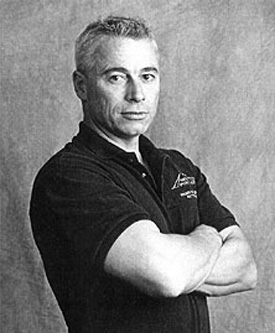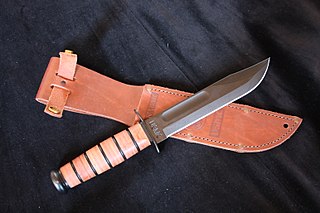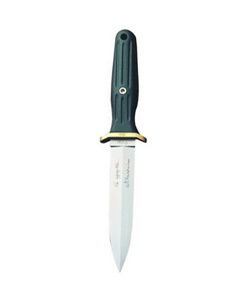
Gerber Legendary Blades is an American maker of knives, multitools, and other tools for outdoors and military headquartered in Portland, Oregon. Gerber is owned by the Finnish outdoors products company Fiskars. Gerber was established in 1939 by Pete Gerber.

Ernest R. Emerson is an American custom knifemaker, martial artist, and edged-weapons expert. Originally an engineer and machinist in the aerospace industry, Emerson became a knifemaker by producing knives for a martial arts class and making art knives early in his knifemaking career. In the 1980s he became better known for his combat knives and popularizing a style of knife known as the Tactical-folder.

A combat knife is a fighting knife designed solely for military use and primarily intended for hand-to-hand or close combat fighting.

Christopher Stanley Reeve is a South African-American knife maker, recognized as one of the most influential people in knife making history. Reeve founded Chris Reeve Knives (CRK) in 1984. In 2014, Reeve retired and was inducted into the Blade Magazine Hall of Fame in 2015.
Robert Waldorf Loveless, a.k.a. Bob Loveless or RW Loveless, was an American knife maker who designed and popularized the hollowground drop point blade and the use of full tapered tangs and screw-type handle scale fasteners within the art of knifemaking. He is cited by other knifemakers and collectors as one of the most innovative custom knife makers in the world.
Kershaw Knives designs, sources and manufactures a wide range of knives, including pocketknives, sporting knives, and kitchen cutlery. Kershaw is a brand of Kai USA Ltd., a member of the KAI Group, headquartered in Tualatin, Oregon, United States.
Blade is a consumer magazine about knife collecting. The magazine is based in Appleton, Wisconsin.

The Linerlock is a locking mechanism for folding pocket knives. A Linerlock is a folding knife with a side-spring lock that can be opened and closed with one hand without repositioning the knife in the hand. The lock is self-adjusting for wear. The modern Linerlock traces its lineage to the late 19th century, but in the 1980s the design was improved by American custom knifemaker Michael Walker.

Cold Steel, Inc. is an American retailer of knives/bladed tools, training weapons, swords and other martial arts edged and blunt weapons. Founded in Ventura, California, the company is currently based in Irving, Texas after an acquisition by GSM Outdoors in 2020. Cold Steel products are manufactured worldwide, including in the United States, Japan, mainland China, Taiwan, India, Italy and South Africa.
Murphy Knives was a knife manufacturing company founded by custom knife maker David "Dave" Zephaniah Murphy. Murphy was best known as the original supplier of knives to the Gerber Legendary Blade Knife Company in 1938. Murphy's knives had a distinctive aluminum handle which was later used on many thousands of Gerber knives. Between 1941 and 1954 Murphy made approximately 90,000 Murphy Combat knives for troops to use in World War II. These knives were marked on the handle Murphy Combat with USA on the obverse side. They were made for servicemen during and after World War II. These knives are now collectible by military knife collectors and are scarce despite the large number made.
Chris Reeve Knives is an American knife manufacturing corporation with international sales and distribution headquartered in Boise, Idaho, that designs, develops, and sells folding pocket knives and fixed-blade knives. Its products include the Sebenza, Inkosi, Umnumzaan, TiLock, Mnandi folding knives, Impinda slip joint, and the Green Beret, Pacific, Professional Soldier, Nyala, and Sikayo fixed blade knives. Chris Reeve Knives' industry contributions include the Integral Lock, contributions to the blade steels CPM-S30V and CPM-S35VN, and has won Blade Magazine's Blade Show Manufacturing Quality Award 15 times. Their motto is Think Twice, Cut Once.

The CQC-6 or Viper Six is a handmade tactical folding knife with a tantō blade manufactured by knifemaker Ernest Emerson. Although initially reported as the sixth design in an evolution of fighting knives and the first model in the lineup of Emerson's Specwar Custom Knives, Emerson later revealed that the knife was named for SEAL Team Six. It has a chisel-ground blade of ATS-34 or 154CM stainless steel and a handle made of titanium and linen micarta. The CQC-6 is credited as the knife that popularized the concept of the tactical folding knife.

Ka-Bar is the contemporary popular name for the combat knife first adopted by the United States Marine Corps in November 1942 as the 1219C2 combat knife, and subsequently adopted by the United States Navy as the U.S. Navy utility knife, Mark 2. Ka-Bar is the name of a related knife manufacturing company, Ka-Bar Knives., Inc., of Olean, New York, a subsidiary of the Cutco Corporation.

Al Mar Knives is a production knife company headquartered in Tualatin, Oregon, United States. Al Mar Knives was established in 1979 by Al Mar, and has a reputation for making tactical knives of innovative design. While headquartered in the United States, Al Mar knives were made in Seki City of Japan from 1979 to 2019.

Michael Leon Walker is an American custom knifemaker and sculptor based in Taos, New Mexico. Walker is the inventor of more than 20 different knife mechanisms including the Walker Linerlock for which he secured a trademark in 1980.

The Applegate–Fairbairn fighting knife is a combat knife designed by Colonel Rex Applegate and William E. Fairbairn as a version of the Fairbairn–Sykes fighting knife. The blade has a similar double-edged dagger profile, but is wider and more durable. It features a different handle, made most commonly of Lexan plastic with adjustable lead weights which can change the knife's balance-point. Later models and some custom variants included weights made from pure Teflon, tungsten, stainless steel and aluminum. The blade profile was also changed from a V-grind to a convex, or "appleseed" profile. While this changed the overall effectiveness of the blade to puncture, cut and slice, it does not lend itself to be field sharpened by an inexperienced user. The current production model made by Böker in Solingen, Germany, uses a fiberglass reinforced delrin handle which solves the issues with earlier models where the handle would crack if exposed to heat.

A fighting knife has a blade designed to most effectively inflict injury in close-quarters physical confrontations. The combat knife and the trench knife are examples of military fighting knives.
Walter Wells "Blackie" Collins was an American knife maker who designed and popularized the assisted opening mechanism and various automatic knife designs within the art of knifemaking. He is cited by other knifemakers and collectors as one of the most innovative knife designers in the world and was an author and the founder of what became Blade Magazine. Collins died July 20, 2011 in a motorcycle accident near North, South Carolina.
The Blade Show is an annual tradeshow for the cutlery industry. It is the largest event of its type in the world. The show is owned by Caribou Media Group and is hosted by Blade Magazine. The event has over 1,000 exhibitors and is the host for inductees into the annual Cutlery Hall of Fame. It also hosts the annual Blade HQ Balisong Competition, BladeSports International Cutting World Championships, Blade University, Knife of the Year Awards, and a variety of knifemaking classes and demos. The event takes place every year over the course of several days and brings in knifemakers and knife companies from all parts of world.

Zero Tolerance Knives (ZT Knives) is a knife brand of Kai USA, headquartered in Tualatin, Oregon, United States. Both Zero Tolerance and Kai USA are members of the Kai Group, a global cutlery company.














